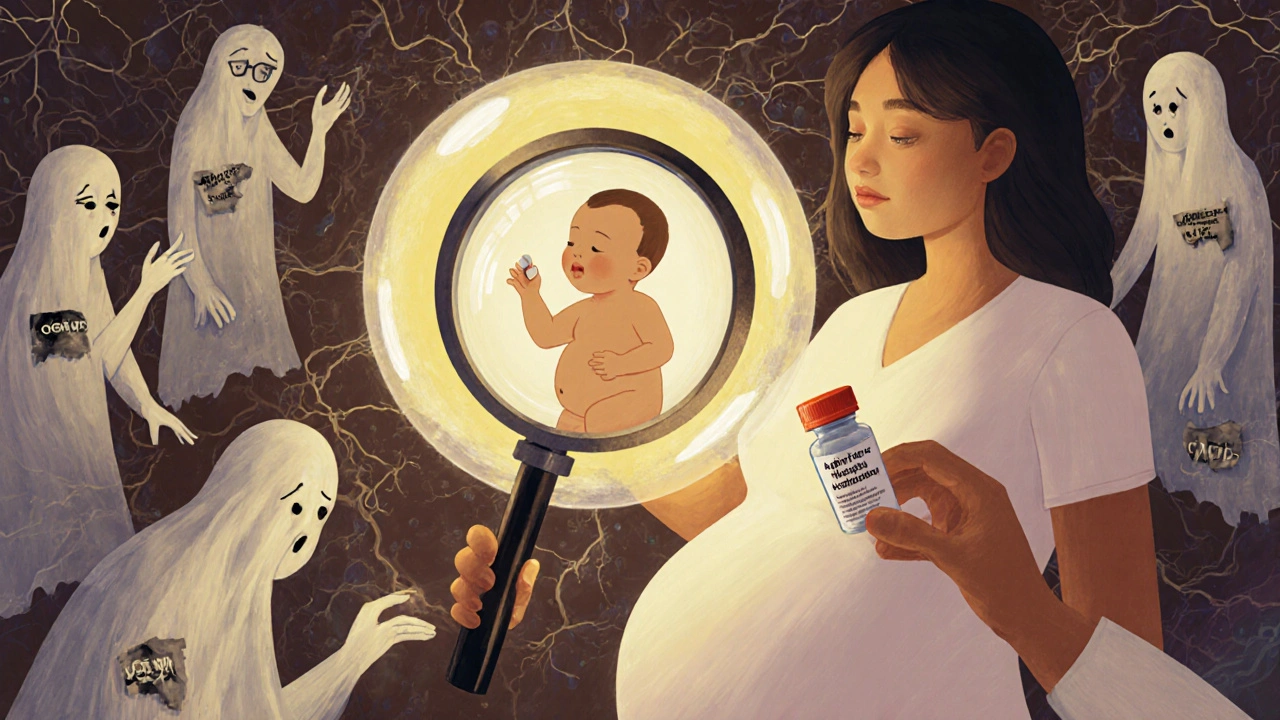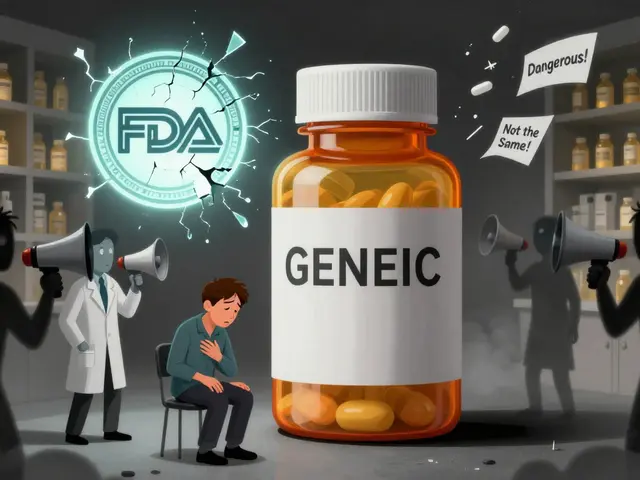
When you're pregnant, even a simple headache or fever can feel overwhelming. You want relief, but you're terrified of harming your baby. The truth is, not all pain relievers are created equal - and knowing which ones are safe, and when, can make all the difference.
Acetaminophen: The Go-To Choice Through All Three Trimesters
Acetaminophen (also known as paracetamol) is the only over-the-counter painkiller that doctors consistently recommend throughout pregnancy. It’s been used safely for decades, and decades of research back it up. From the first week of pregnancy to the day you give birth, acetaminophen remains the standard for treating fever, headaches, muscle aches, and other common discomforts.
Standard dosing is 325 to 1,000 mg every 4 to 6 hours, with a maximum of 4,000 mg per day. Many women find 500 mg is enough to manage symptoms without overdoing it. The key is using the lowest dose for the shortest time needed. If you’re taking it for more than 3 to 5 days in a row, talk to your provider. It’s not because it’s dangerous - it’s because persistent pain or fever might signal something else that needs attention.
A 2023 study tracking over 97,000 mother-child pairs found no link between acetaminophen use and autism, ADHD, or intellectual disability in children. The adjusted odds ratios were nearly 1.0 - meaning no increased risk. Even when researchers looked at long-term use, the data didn’t show harm. The American College of Obstetricians and Gynecologists (ACOG), the Society for Maternal-Fetal Medicine, and the American Academy of Pediatrics all agree: acetaminophen is safe.
And here’s something important: untreated fever during pregnancy is riskier than taking acetaminophen. A fever above 102°F in the first trimester can raise the risk of neural tube defects by up to 2.3 times. A fever above 100.4°F increases miscarriage risk by 1.5 times. So if you’re running a temperature, reaching for acetaminophen isn’t risky - it’s protective.
NSAIDs: When and Why They’re Not Safe
NSAIDs - like ibuprofen (Advil, Motrin), naproxen (Aleve), and diclofenac (Voltaren) - are common pain relievers, but they’re not safe for most of pregnancy. The FDA updated its guidance in October 2020, and now the rule is clear: avoid NSAIDs after 20 weeks.
Why 20 weeks? Because that’s when the baby’s kidneys start producing amniotic fluid. NSAIDs block prostaglandins, which are needed for healthy blood flow to the fetal kidneys. If those kidneys don’t work right, amniotic fluid levels drop. This condition is called oligohydramnios. It can happen within 48 to 72 hours of taking an NSAID after 20 weeks. In studies, 1 to 2% of babies exposed to NSAIDs after 20 weeks developed this issue. That’s rare, but serious - it can affect lung development and cause complications during delivery.
After 30 weeks, NSAIDs add another risk: they can cause the fetal ductus arteriosus - a vital blood vessel in the baby’s heart - to close too early. This can lead to high blood pressure in the baby’s lungs and heart strain. The risk is low (0.5-1%), but again, it’s preventable.
Many people don’t realize NSAIDs are hiding in other medications. About 30% of cold and flu remedies contain ibuprofen or naproxen. That’s why reading labels matters. If a product says “nonsteroidal anti-inflammatory” or lists “ibuprofen,” “naproxen,” or “diclofenac,” put it back. Even if you’re only 18 weeks along, don’t assume you’re safe - you might be further along than you think.
What About Aspirin?
Low-dose aspirin (81 mg) is an exception. When prescribed by a doctor for preeclampsia prevention, it’s safe and even recommended. But regular-strength aspirin - the kind you take for a headache - is not. Aspirin is an NSAID, and it carries the same risks as ibuprofen or naproxen after 20 weeks. Don’t confuse the two.

Why the Confusion? Misinformation Is Everywhere
Despite clear medical guidelines, many pregnant people avoid acetaminophen entirely. A 2023 survey found that 68% of pregnant patients avoid all pain medication, and 42% specifically avoid acetaminophen because of rumors about autism or ADHD.
Those fears come from studies that show a correlation - not causation. For example, some studies found that women who took acetaminophen frequently were more likely to have children with developmental delays. But those women were also more likely to have had infections, fevers, or chronic pain - all of which are independently linked to developmental outcomes. The acetaminophen wasn’t the cause; the underlying condition was.
Reddit threads, Instagram posts, and even well-meaning friends repeat these myths. One mom in a 2024 online forum said she stopped her prescribed acetaminophen because she read it “might cause autism.” Her doctor had to explain: the risk of untreated fever was higher than any theoretical risk from the medication.
And here’s the irony: the same people who avoid acetaminophen often take NSAIDs early in pregnancy, thinking they’re safer. But NSAIDs aren’t safe at any point without medical supervision. And if you’re unsure how far along you are - which many women are - it’s better to avoid them entirely.
What Should You Do?
Here’s a simple guide to follow:
- First trimester (weeks 1-12): Acetaminophen is safe. Avoid NSAIDs unless your provider says otherwise - even though the biggest risks start at 20 weeks, it’s best to avoid them from the start.
- Second trimester (weeks 13-26): Stick with acetaminophen. If you absolutely need an NSAID (say, for severe arthritis), talk to your doctor. Use the lowest dose for the shortest time - no more than 48 hours - and get an ultrasound to check amniotic fluid levels.
- Third trimester (weeks 27-40): No NSAIDs. Period. Acetaminophen remains the only safe option for pain or fever.
Always check the Drug Facts label on any OTC medicine. Look for the active ingredients. If you see “ibuprofen,” “naproxen,” or “aspirin,” skip it. If it says “acetaminophen,” you’re good - as long as you don’t exceed 4,000 mg per day.

What If You Accidentally Took an NSAID?
If you took an NSAID once or twice before you knew you were past 20 weeks, don’t panic. One or two doses rarely cause problems. But stop taking it immediately. Let your provider know. They may recommend an ultrasound to check amniotic fluid levels. Most cases resolve quickly once the medication is stopped.
If you’ve been taking NSAIDs daily for more than 48 hours after 20 weeks, contact your provider right away. Oligohydramnios can develop fast, and early detection makes a big difference.
The Bigger Picture: Your Health Matters Too
There’s a dangerous myth that “if it’s not 100% safe, don’t take it.” But in pregnancy, that mindset can hurt you more than help. Chronic pain, uncontrolled fever, or sleepless nights from migraines aren’t just uncomfortable - they raise your risk of preeclampsia, preterm birth, and even postpartum depression.
Acetaminophen isn’t a perfect drug. But it’s the safest option we have. The conditions it treats - fever, infection, pain - are far more dangerous than the medication itself. As ACOG’s president said in 2025: “The risks of not treating pain and fever are far greater than any theoretical risk from acetaminophen.”
Don’t let fear silence your needs. If you’re in pain, you’re not weak. You’re human. And taking acetaminophen responsibly isn’t being careless - it’s being smart.
What’s Next? Research Is Still Evolving
Scientists are still studying acetaminophen. The NIH is running a major study called the Acetaminophen Birth Cohort, tracking 10,000 pregnancies through 2027. They’re looking at long-term child development, genetic factors, and how metabolism changes during pregnancy.
One early finding: about 15% of pregnant women have a gene variant (CYP2E1) that affects how their body breaks down acetaminophen. This might mean they need different dosing. But we don’t yet have clinical guidelines for that.
For now, the best advice is simple: use acetaminophen when you need it, at the right dose, for the shortest time. Avoid NSAIDs after 20 weeks. And if you’re unsure - ask your provider. You’re not alone in wondering. Millions of women have asked the same question. And the answer hasn’t changed: acetaminophen is safe. You can trust it.






10 Comments
I used acetaminophen all three trimesters and never thought twice about it. My OB said it was fine, and honestly, I needed it for migraines that were making me cry. Didn’t want to be that mom who’s useless because she won’t take a pill. My kid’s 3 now-no issues, no delays, just a kid who loves dinosaurs and hates naps.
/p>People scare themselves with Reddit threads. I swear, half the stuff online is just fear dressed up as wisdom.
It’s astonishing how deeply ingrained medical misinformation has become in maternal culture, particularly in the context of pharmacological safety during gestation. The notion that acetaminophen poses a latent neurodevelopmental risk is not only unsupported by robust epidemiological data, but it actively undermines maternal autonomy and physiological well-being.
/p>As a clinician-scientist with over 15 years in maternal-fetal medicine, I’ve seen firsthand how untreated maternal fever elevates the risk of neural tube defects, preterm labor, and even stillbirth-risks orders of magnitude greater than any theoretical association with acetaminophen. The 2023 cohort study involving 97,000 mother-child pairs remains the gold standard in this domain, and its findings have been replicated across multiple continents.
Moreover, the conflation of correlation with causation in popular discourse-where mothers with chronic pain or infection are blamed for medication use rather than the underlying pathology-is not merely misleading; it’s ethically negligent. We must prioritize evidence over anecdote, especially when lives are at stake.
NSAIDs after 20 weeks? Absolutely contraindicated. But acetaminophen? It’s not just safe-it’s a lifeline.
Just wanted to add: if you're taking anything with 'NSAID' on the label, check the active ingredients. I once took a cold med thinking it was just a decongestant-and it had naproxen. Found out at my 24-week ultrasound when fluid was low. Scared the crap out of me. Turned out fine after I stopped, but I wish I'd known sooner.
/p>Read the tiny print. Always. Even if you think you're 'only 18 weeks.' You might be further along than you think.
Bro… I’m Nigerian and we just take whatever works. My wife took paracetamol like candy during preggo and our son is now a 5-year-old genius who draws dragons better than me. No drama. No panic. Just medicine. 😎
/p>Stop overthinking. Your brain is your enemy here.
Let me get this straight-some woman in Ohio read a blog post and now thinks acetaminophen causes autism? Meanwhile, the FDA, ACOG, and the AAP all say it’s fine, but somehow TikTok doctors know better?
/p>What’s next? Are we going to ban prenatal vitamins because someone on Instagram said they ‘alter the soul’? This isn’t healthcare-it’s witch hunt culture wrapped in a onesie.
And don’t even get me started on people taking Advil at 12 weeks thinking they’re safe. That’s not bravery. That’s ignorance with a due date.
My wife took Tylenol every time she had a headache during her first pregnancy. We didn’t even think about it. Kid’s 7 now, straight A’s, plays violin, no issues. Meanwhile, I had a cousin who refused all meds and ended up in the ER with a 103°F fever at 14 weeks. They had to admit her. That’s the real danger.
/p>Just use it. Don’t overthink. Don’t panic. Your body knows what it’s doing.
Love this breakdown. Seriously. I’m a dad, not a mom, but I’ve read this post 3 times and shared it with every pregnant friend I know.
/p>One thing I’d add-don’t forget that stress from *not* taking meds can be worse than the meds themselves. I’ve seen partners lose sleep over whether a Tylenol is ‘worth it.’ That’s not care-that’s anxiety in disguise.
Also, if you’re reading this and you’re scared? Talk to your provider. Not Google. Not your aunt. Your actual doctor. They’ve seen this a thousand times. You’re not alone.
As someone who grew up in India where paracetamol is the first thing you grab for fever, headache, or even a sore throat, I’m baffled by the hysteria in the West. My mom took it through all three trimesters with me, and I’m now a healthy 28-year-old engineer who plays rugby on weekends.
/p>Meanwhile, my cousin in California refused anything and suffered from migraines so bad she couldn’t eat for weeks. Her baby was born underweight-not because of meds, but because she was in constant pain.
Medicine isn’t magic. It’s science. And science says: use acetaminophen. Avoid NSAIDs after 20. Simple. Clean. Life-saving.
Oh please. ‘Acetaminophen is safe’? Yeah, right. That’s what they said about thalidomide too. And now we’re raising a generation of kids with ADHD because moms took ‘safe’ pills while pregnant. Wake up.
/p>Why do you think autism rates are skyrocketing? Coincidence? Or did Big Pharma finally get their way and convince everyone that poison is medicine?
And don’t even get me started on how they’re pushing this on women who don’t even know they’re pregnant. It’s a slow poison, and you’re all drinking it willingly.
Wow. Just… wow. I didn’t even know you could get this emotional about a painkiller.
/p>Let me say this again: my kid is 3. He talks in full sentences, recognizes all the planets, and asks why the moon follows us. He’s not autistic. He’s not ADHD. He’s just… a kid.
And I took Tylenol. Like, a lot. Because I was in pain. And I didn’t let fear make me suffer.
If you’re scared? Talk to your doctor. Not strangers on the internet. You’re not a lab rat. You’re a person.